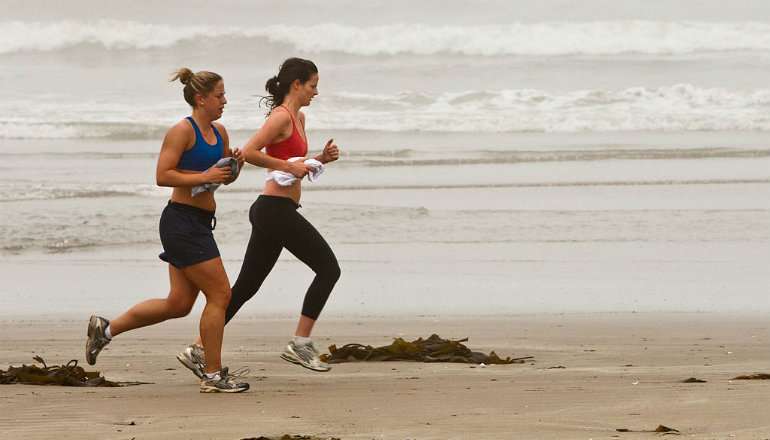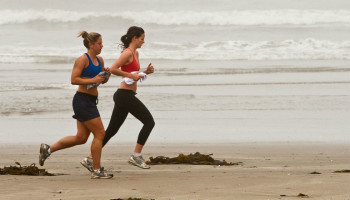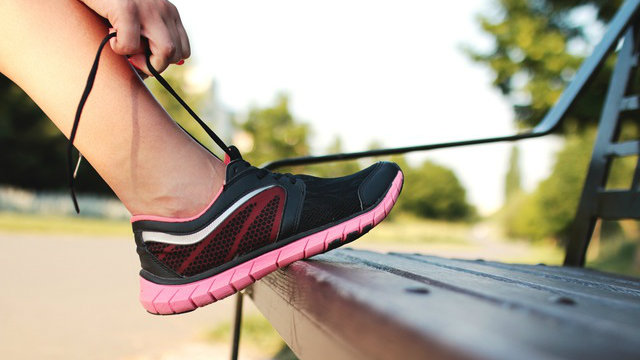 Reading Time: 4 minutes
Reading Time: 4 minutesWhen I started run coaching I thought that most of my athletes would be competitive runners looking for an edge on race day. It didn’t work out that way. Instead, the vast majority of my coaching is remediation work for runners who have been sidelined with injuries.
For a long time, I flattered myself that I was developing a profile as “the guy who can fix broken runners.” But as I took on more clients, I realized my abilities have nothing to do with it. It’s all about supply and demand: the demand for corrective coaching is high because up to 65% of all runners are injured every year.
At this point, I just I wish I could get to people before they start running. Much pain and angst could be avoided. Short of that, the best thing I can do is to provide the following dos and don’ts for aspiring runners out there. I hope this advice can get you started on a lifetime of fun, healthful, and injury-free running.
1. DON’T Go Out and Buy Fancy Shoes
For new runners, the right shoes for you are the ones you already have. This may seem counter-intuitive. After all, conventional running shoes weaken your feet, ankles, and calves. Shouldn’t you want to strengthen your lower extremities with a slick pair of minimalist or five-finger running shoes? If only it were so easy. The reality is that running in unfamiliar shoes causes you to run in an unfamiliar way on unprepared feet. If you add high mileage into the mix nothing good can happen.
2. DO Hire a Running Coach
Remember all that money you saved by not buying new shoes? Use that money instead to pay for a one-hour private running lesson with a good instructor. If you are like most people, you will ignore this advice. After all, why should you spend money to learn something everybody already knows how to do? Aren’t we “born to run”? Yes, we are all born to run. We are also born to throw. But if you gave ten people a baseball to throw, you would get ten different outcomes. The difference between most people and, say, Nolan Ryan is the coaching, not the shoes.
3. DON’T Ignore Pain
There is a word for the people who train in macho and self-destructive ways. The word is “meatheads,” and you might have noticed that the running community is beset with them. In the world of meathead running (which tightly overlaps the world of marathoning), pain is celebrated and injuries are seen as badges of honor. Finishing races is the greatest accomplishment a meathead runner aspires to, which is why meatheads never take the podium or a top-ten finish. What meathead runners don’t realize is that pain is not normal. Pain is your body telling you that you’re running poorly, which in almost every case equates to running slowly. In my book, that is not something to celebrate or glamorize.
4. DO Prehab and Rehab
Self-care for runners is a vast topic worthy of an entire book, but I will attempt to simplify. Avoid stretching before you run because stretching decreases muscle elasticity and increases risk of injury. Prior to running, your goal should be to prepare joints and tissues by pumping blood into your calves, ankles, and feet. I like to walk twenty paces on my toes and then twenty paces on my heels, switching back and forth for about eighty meters. After your run, you should prioritize foot care. A cheap and effective way to rehab feet is to roll them out on top of a lacrosse ball.
5. DON’T Start Running by Training for a Race
Conventional race training programs are really based on volume management. You will find that for the majority of training programs, volume steadily climbs to a peak with a very short taper before the race. Why does that matter? Well, if your running is technically flawed, you will be “repeating wrong” with greater and greater frequency as you get closer and closer to your race. Repeating wrong is why so many runners carry injuries into race day. If you are a new runner, your goal should be to keep it light, safe, and sustainable as you pursue technical perfection. Race prep is inherently stressful and tends to drain the fun out of running when you most need it to be fun.
6. DO Plan to Run for the Rest of Your Life
Running is part of our unique genetic endowment. It is one of the most invigorating, healthful, and spiritual activities humans can do. Running is like the fountain of youth. A very small amount of it can increase your lifespan. Rather than work within the time constraints of a race, try to weave running into your life, as a health practice that will carry you into old age, rather than a competitive pursuit that will take years off your life.









